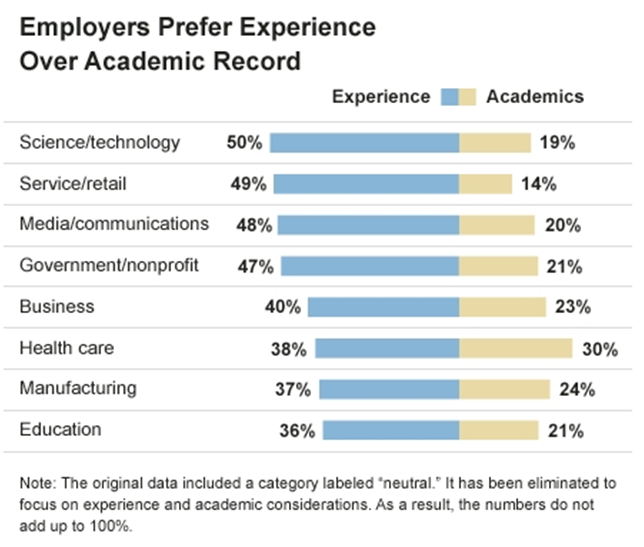A must-read guide to how, when and how often to apply for an internship


This article is based on the free eBook “21st Century Internships – How to get a job before graduation”
In our current economy, the “entry-level” professional has been significantly – perhaps negatively – impacted; organizations are running leaner – and must “do more with less”.
As a result, many believe the days of securing a job based on having a college degree alone, without practical experience, are gone. Some would say there is no such thing as an entry-level position anymore; employers are demanding – and hiring – young talent ready to go to work, right now.
This is where internships play a major role in the education process, careers and the workplace.
According to a survey by the Chronicle of Higher Education and American Public Media’s Marketplace, employers strongly prefer relevant experience over academic achievement:

Other than greatly increasing your employability, there are many reasons why an internship is vital to your career development:
- Practical experience
- Confidence and professional poise
- Professional networking opportunities
- Validation of choice of major, degree and career
- Development of an employable personal brand
- First-hand knowledge of the industry and/or company
- A sense of contribution in a non-academic environment
- Development of high-impact mentor relationships
How many internships should I complete?
When many of us think of internships, we think of the single 40-hour-per-week, 10-week summer program performed between our junior and senior years. While these traditional summer internships remain prevalent, there are now many other forms of internships that contribute greatly to your employability.
- During semester | 10 to 20 hour-per-week internships performed while attending class
- Virtual | Year-round internships performed remotely via internet, Skype, email, etc.
- Project-based | Internships focused on completing a single specific task or business function
Regardless of the type of internship you pursue, the new standard for internships is to complete one high-impact internship for every year you’re in college…
- An undergraduate degree = 4 completed internships
- A post-graduate degree = a total of 6 completed internships
While this “new normal” is a dramatic change from just a few years ago (and, frankly, a lot of work) consider this: organizations like Google, AOL, TripAdvisor – and many highly coveted internship hosts – prefer you already have 3 to 5 internships under your belt to even be considered for their internships.
Yes, the internship world is now that competitive.
While you should complete at least one internship per year, you simply cannot over-commit. Otherwise, your classes, personal life and even your health may be affected.
Good general rules:
- When taking classes full-time: take on no more than one 10 to 15 hour-per-week internship; very important: be sure to make sure the employer understands you are fully committed to your academics and is willing to work around your existing – and properly communicated – schedule
- Winter break: Take on a project-based internship of no more than 4 to 6 weeks; to allow time to spend with your family, consider a virtual internship
- Summer break: Take on the larger, perhaps full-time, 10 to 13 week commitment… and go “all in”
When should I apply?
Some young careerists begin school with very little idea of what career path to take when they graduate. That’s natural; college is a time for growth and exploration. And that includes career exploration!
The earlier you start, the more time you have to gain experience. Just as important, you’ll have a clear idea whether your degree – and chosen profession – is right for you. Wouldn’t you rather know that now… instead of just before your senior year… when you can still change your major/degree and dodge the “my job sucks” bullet?
Keep in mind: Explore your career possibilities through internships as soon as possible– starting your freshman year.
Here’s what may be most important, however…
When you find an open internship position that intrigues you, research the company, tailor your resume/CV to the position, write a high-quality cover letter and apply. Don’t over-prioritize the “season”. Don’t think about “Will they think I’m too young?”
When you present yourself as a confident and competent candidate, and you have the skill set that matches the recruiter’s needs, you’ve given yourself the best chance to get an interview. Neither your timing – nor your age – will matter.
One more thought on when to apply…
During your current internship, make sure you’re networking – making contacts and building relationships that will help you gain your next position.
Another good way to plan ahead is to periodically (but regularly) review online internship and job postings in your industry. Do so not necessarily with the intent to apply, but to become familiar with the latest skills employers in your field are hiring for, and what responsibilities you might face in those positions.
This “eye on your future” will help guide your career development, and give you an edge over much of your competition.
To learn more about the internship process you can download and read the free eBook “21st Century Internships – How to get a job before graduation” written by David Shindler from The Employability Hub and Mark Babbitt from YouTern.




